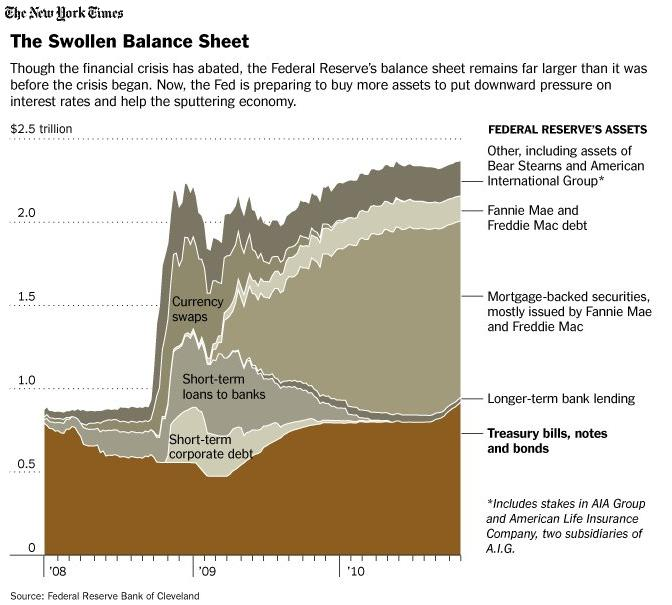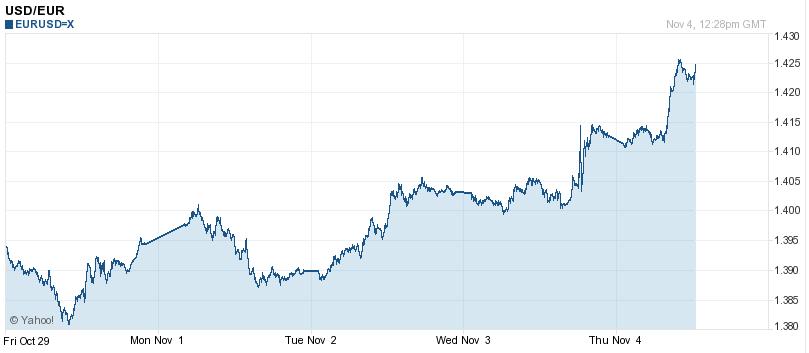November 4th 2010
Fed Surprises Markets with Scope of QE2
For the last few months, and especially over the last few weeks, the financial markets have been obsessed with the rumored expansion of the Fed’s Quantitative Easing program (“QE2”). With the prospect of another $1 Trillion in newly minted money hitting the markets, investors presumptively piled into stocks, commodities, and other high-risk assets, and simultaneously sold the US Dollar in favor of higher-yielding alternatives.

On Wednesday, rumor became reality, as the Fed announced that it would expand its balance sheet by $600 Billion through purchases of long-dated Treasury securities over the next six months. While the announcement (and the accompanying holding of the Federal Funds Rate at 0%) were certainly expected, markets were slightly taken aback by its scope.
Due to conflicting testimony by members of the Fed’s Board of Governors, investors had scaled back their expectations of QE2 to perhaps $300-500 Billion. To be sure, a handful of bulls forecast as much as $1-1.5 Trillion in new money would be printed. The majority of analysts, however, New York Fed chief William Dudley’s words at face value when he warned, “I would put very little weight on what is priced into the market.” It was also rumored that the US Treasury Department was working behind the scenes to limit the size of QE2. Thus, when the news broke, traders instantly sent the Dollar down against the Euro, back below the $1.40 mark.

On the one hand, the (currency) markets can take a step back and focus instead on other issues. For example, yields on Eurozone debt have been rising recently due to continued concerns about the possibility of default, but this is not at all reflected in forex markets. During the frenzy surrounding QE2, the forex markets also completely neglected comparative growth fundamentals, which if priced into currencies, would seem to favor a rally in the Dollar.
On the other hand, I have a feeling that investors will continue to dwell on QE2. While the consensus among analysts is that it will have little impact on the economy, they must nonetheless await confirmation/negation of this belief over the next 6-12 months. In addition, all of the speculation to date over the size of QE2 has been just that – speculation. Going forward, speculators must also take reality into account, depending on how that $600 Billion is invested and the consequent impact on US inflation. If a significant proportion of is simply pumped into domestic and emerging market stocks, then the markets will have been proved right, and the Dollar will probably fall further. If, instead, a large portion of the funds are lent and invested domestically, and end up buoying consumption, then some speculators will be forced to cover their bets, and the Dollar could rally.
Unfortunately, while QE2 is largely seen as a win-win for US stocks (either it stimulates the economy and stocks rally, or it fails to stimulate the economy but some of the funds are used to foment a stock market rally anyway), the same cannot be said for the US Dollar. If QE2 is successful, then hawks will start moaning about inflation and use it as an excuse to sell the Dollar. If QE2 fails, well, then the US economy could become mired in an interminable recession, and bears will sell the Dollar in favor of emerging market currencies.




April 27th, 2011 at 3:33 pm
[…] investors (who correctly anticipated the continuation of the stock market rally). In November, I reported that QE2 was unfairly labeled a lose-lose by the forex markets: “If QE2 is successful, then […]